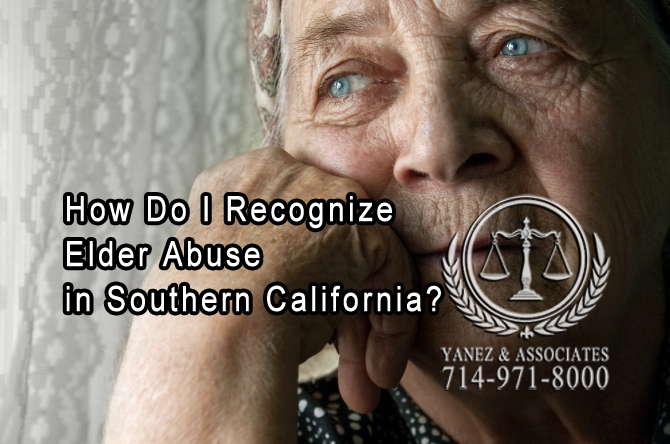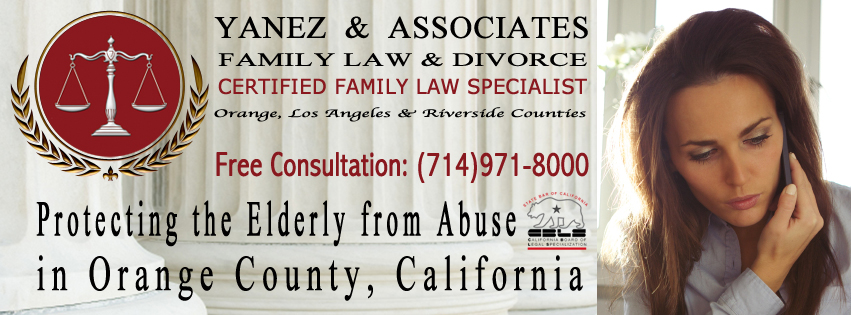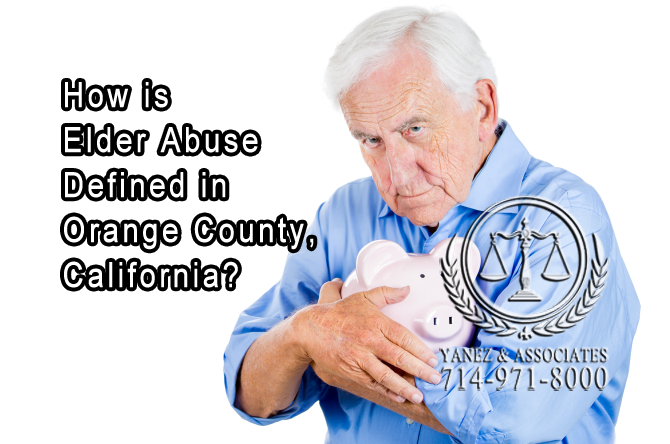Protecting the Elderly from Abuse in Orange County, Southern California
In California, it is every person’s responsibility to protect the elderly from abuse. If you are aware of elder abuse taking place, or if you suspect that it is taking place, report it as soon as possible.
It is important to understand what elder abuse is, how to recognize possible signs of elder abuse, and how to report elder abuse in California.
How is Elder Abuse Defined in Orange County, California?
Elder abuse can include any violence, abuse, neglect, exploitation, or mistreatment of a person who is either 65 years old or older, or of a dependent adult between the ages of 18 and 64.
Unfortunately, it is often at the hands of caregivers that elders suffer abuse. Caregivers are often responsible for the health and well being of elders, from providing protection from health and safety hazards to providing shelter, food, water, medical care, assistance with personal hygiene, prevention of self neglect, and more. A caregiver who fails to meet these requirements, or one who is verbally, mentally and emotionally abusive can be accused of Elder Abuse.
Abuse can include the following types of situations.
• Physical Abuse - This can include any type of physical injury, including sexual abuse, sexual assault, molestation, or the improper or non-prescribed use of physical or chemical restraints, or any type of over punishment.
• Neglect - When a caretaker is responsible for the health and wellbeing of an elder or dependent adult, any failure to fulfill those obligations can constitute abuse. Obligations can include provisions of food, water or shelter, protection from health or safety hazards, personal hygiene, or other things.
• Abandonment - A caretaker who is responsible for the care of an elder who deserts that elder can be guilty of abandonment.
• Isolation - Preventing an elder or dependent adult from contacting or being contacted by friends or loved ones, or communicating with those loved ones can be considered isolation.
• Abduction - Taking an elder or dependent adult from his or her home state to another state without consent is considered abduction.
• Mental Suffering - Mental suffering can be caused in several ways, by inflicting fear, threatening, harassing, intimidating, agitating, or confusing an elder.
• Financial Abuse - Financial abuse can include various actions, from using an elder person’s funds without his or her consent to taking illegal actions with his or her property to forging signatures. Any illegal or unethical use of an elder’s funds or property can constitute financial abuse.
How Do I Recognize Elder Abuse in Southern California?

How Do YOU Recognize Elder Abuse in Southern California?
Elder abuse has many warning signs, depending on the type of abuse that is taking place.
• Poor hygiene, from uncombed or matted hair to odd smells, looking dirty or unkempt,
• Missing patches of hair, blood in the hair or a bleeding scalp,
• Unexplained weight loss, malnutrition or dehydration,
• Torn or bloody clothing or undergarments,
• Unexplained physical injuries including scratches, scrapes, blisters, lacerations, pinch marks, etc.
• Broken bones that cannot be explained by health reasons,
• Injuries that do not match their explanations,
• Injuries in the shape of a physical object, like markings from a belt or cord, burns in the shape of a cigarette, or marks in the shape of a hand,
• Burns from ropes, cigarettes or hot water
• Multiple other signs of abuse
The above listed signs may mean that an elder has suffered physical or sexual abuse at the hands of a caregiver or another adult. Verbal and mental abuse can include other signs that may not be as apparent to outside parties. The following actions may be signs of unwarranted chemical restraints, or of emotional, verbal and mental abuse,
• Acting withdrawn, especially if the elder is usually outgoing,
• Depression,
• Helplessness,
• Unexplained anger,
• Fright,
• Acting secretive,
• Unwillingness to talk freely either in the presence of a specific person, or without a specific person being present,
• The inability to contact an elder,
• Not receiving responses from an elder when you try to contact him or her,
• The inability to schedule time with or spend time with the elder.
Financial abuse can be the most difficult type of abuse to detect, especially if you are not aware of the elder’s finances. If you can, look for the following.
• Unexplained expenses, especially purchasing things that the elder will not or is not able to use,
• ATM withdrawals at an ATM that the elder cannot access,
• Unusual or new people offering to care for the elder’s finances,
• Unexplained or unusual repairs to the elder’s home, or financial schemes from door to door salesmen or telemarketers
• There are many more signs to watch out for, especially if a specific person is in charge of the elder’s finances.
What Should I Do if I Suspect Elder Abuse in Southern California?
If you suspect that elder abuse has occurred, report it. It is always better to report abuse and find that it has not occurred than to fail to report it and find out later that it has been going on for some time and you took no action to stop it. The elder, like most victims of abuse, may feel powerless to stop it, and depends on you for protection.
If the abuse takes place in a long term care facility, contact your local Long Term Care Ombudsman, a local law enforcement agency, or the Bureau of MediCal Fraud and Elder Abuse.
By reporting elder abuse in California, you are protected from liability - but failing to report could lead to criminal charges.
Elder Abuse Lawyer in Orange County, California

The attorneys at Yanez & Associates are here to help. Contact us today to schedule a free initial consultation.
It is always important to look out for those in your community, whether they are loved ones, friends, neighbors, or those elders who do not have others to count on. If you suspect elder abuse in a long term care facility, abuse of a loved one, or abuse of an elder in your community, contact the authorities as soon as possible.










